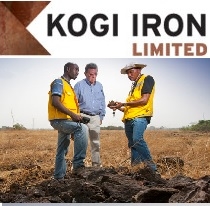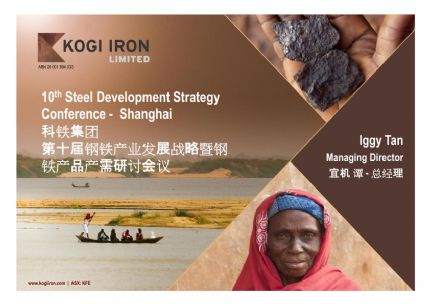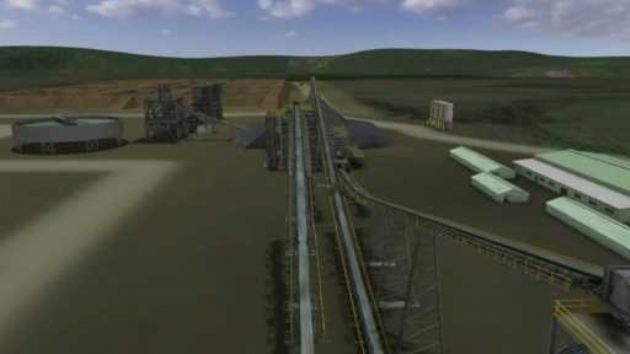 Further Optimises Barging Study
Further Optimises Barging Study
Perth, Jan 22, 2014 AEST (ABN Newswire) - Australian based iron ore development company, Kogi Iron Limited ( ASX:KFE) ("Kogi", "Kogi Iron", or the "Company") and its 100% owned Nigerian operating company, KCM Mining Limited ("KCM"), are pleased to report the results of a recently completed optimisation of its Niger River Barging Study.
ASX:KFE) ("Kogi", "Kogi Iron", or the "Company") and its 100% owned Nigerian operating company, KCM Mining Limited ("KCM"), are pleased to report the results of a recently completed optimisation of its Niger River Barging Study.
Niger River Barging Study
On 14 October 2013 the Company announced the results of the Niger River Barging Study, which was conducted by South African port and costal engineering consultants Prestedge Retief Dresner Wijnberg (Pty) Ltd ("PRDW"). The study investigated the feasibility of using river barges to transport iron ore concentrate from the Company's Agbaja Project via the Niger River to the Gulf of Guinea, then transhipment to large ocean going vessels ("OGVs"). The study concluded that river barging and transhipment was feasible and an economic transport option. The study recommended that iron ore concentrate be initially transported by river barge from a barge loading location south of Banda on the Niger River to the established port of Warri in the Gulf of Guinea where existing port infrastructure would be used to stockpile then re-load the concentrate onto a separate fleet of deeper draft ocean going barges for transhipment to OGVs moored offshore.
As part of the current Preliminary Feasibility Study ("PFS"), PRDW in conjunction with engineering consultants Wilson, Campbell & Associates ("WCA") have completed an optimisation of the Niger River Barging Study. The optimisation has resulted in the removal of the proposed re-handle of iron ore concentrate at Port Warri, bringing about a reduction in capital and operating cost estimates. The previously contemplated Port Warri stockpile and re-handle will be replaced with a river barge to ocean going barge transfer station at Escravos, in the Niger River delta ("Escravos Transfer Station").
Optimised PFS Transport Solution
The optimised transport solution involves iron ore concentrate being pumped from the Agbaja Plateau down to the Banda barge loading facility (located on the west bank of the Niger River close to Banda), a distance of ~22 km. The concentrate will then be filtered to reduce the moisture content to less than 10% and conveyed to a covered stockpile.
Barge loading from the stockpile will take place using a travelling, luffing, telescoping barge loader filling Mississippitype barges in a four barge configuration.
Each barge configuration will have dimensions of 21m by 286m long and are designed to carry loads of 4,800t to 8,000t, depending on river water levels. A configuration will be propelled by shallow draft four engine push boats with a preferred speed of 10 knots. Iron ore concentrate will be transported ~ 602km from Banda along the Niger River to the Escravos Transfer Station, a journey time of ~33 hours.
At the Escravos Transfer Station the concentrate will be transferred to a 20,000t ocean going sea barge. A stockpile arrangement (twin storage domes) may be required to ensure that each river barge configuration can be unloaded while the large ocean barge is travelling to the transhipment facility. The Escravos stockpile will allow the ocean barge to be loaded at a rate of 4,000t/hr and will minimise loading wait times and river barge cycles.
The 20,000t self-propelled and self-unloading ocean going barge will be capable of transferring the concentrate to a floating transhipment storage facility in the Gulf of Guinea approximately 33km offshore. The floating transhipment facility will have a storage capacity of 200,000t and allow for the loading of Panamax and Cape size OGV's for global export markets.
Estimated Barging Costs
As part of the PFS, barging costs have been estimated to include the loading of river barges at Banda, river travel, transfer costs at Escravos, ocean travel to the floating transhipment facility, subsequent loading of OGV's and owner operating costs. The Free on Board (FOB) operating cost estimate including the lease of river and ocean barges, as well as the transhipment facility and owners costs is detailed in Table 1.
Table 1
--------------------------------------------PFS Barging and Transhipment Cost Estimates-------------------------------------------- US$ per dmt (10% moisture)--------------------------------------------River Barging Operation 10.60Ocean Barging Operation 2.82Transhipment and Loading 4.42Kogi Iron costs 0.93--------------------------------------------Total 18.77--------------------------------------------Cost per tonne kilometre 2.97 cents--------------------------------------------
Kogi Iron Managing Director Iggy Tan said: "The Company is pleased with the outcome of the barging optimisation work which demonstrates that barging transportation of iron ore concentrate is not only a readily available and effective transport solution, but a most economic option. Barging is widely accepted as a lower cost form of bulk commodity transport compared to both rail and trucking, so the proximity of river transport remains a unique competitive advantage of the Agbaja Iron Ore Project. Our estimated FOB transport cost of just under 3 cents/tonne per kilometre, or around $19.00 per tonne of concentrate, puts us in good stead for a highly competitive overall operating cost estimate in our PFS."
To view diagrams, please visit:
http://media.abnnewswire.net/media/en/docs/ASX-KFE-664718.pdf
About Macro Metals Limited
Macro Metals Limited is an ASX-listed company (ASX:M4M) with the intent to build a cast steel plant on the Agbaja Plateau in Kogi State, Nigeria. The project will utilise company leased iron ore deposits and will supply a cast steel feedstock to steel manufacturing and product fabricators in Nigeria and overseas.
![abnnewswire.com]()
Related Companies
Social Media
Share this Article

 ASX:KFE) ("Kogi", "Kogi Iron", or the "Company") and its 100% owned Nigerian operating company, KCM Mining Limited ("KCM"), are pleased to report the results of a recently completed optimisation of its Niger River Barging Study.
ASX:KFE) ("Kogi", "Kogi Iron", or the "Company") and its 100% owned Nigerian operating company, KCM Mining Limited ("KCM"), are pleased to report the results of a recently completed optimisation of its Niger River Barging Study.








